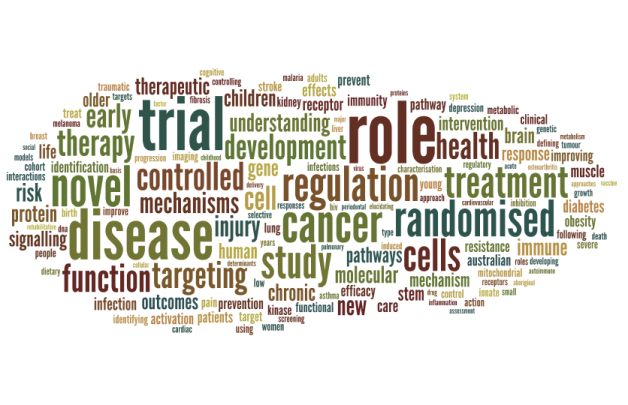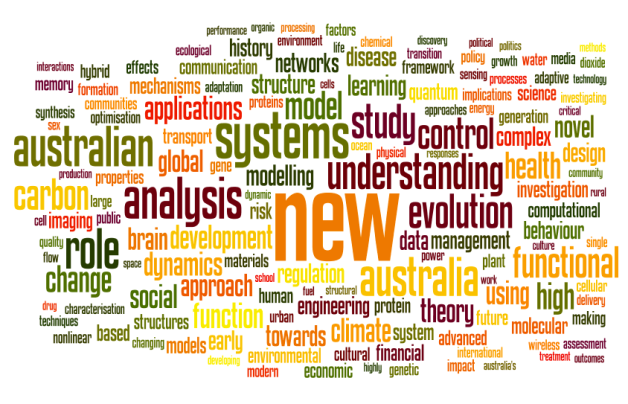Last week I posted a word cloud of NHMRC grant titles. People on twitter liked it and some asked for a similar thing but with ARC Discovery titles. Where the NHMRC funds only medical research, to the tune of more than $600 million or so every year, the ARC funds everything except “clinical medicine and dentistry” so there are going to be obvious differences.
A bit of background
Getting the titles out of the NHMRC document was easy. The titles are in a table in a Microsoft Word document. Making the word cloud was a matter of of copying the column in the table and pasting it into Wordle.
Getting the Discovery Titles from the ARC was… more difficult. The document with the grant outcomes is formatted in a way that makes it very difficult to simply, or even algorithmically, extract the titles from the other details about each grant like chief investigators, universities and so on.
In the end I spent a few hours, in short blocks of time, cutting and pasting from the document. I do not recommend this.
Let’s Review: NHMRC Project Grant Titles
I’ve re-done the word cloud from my last post, with different colours and fonts but you can still see the same things.
NHMRC Grant titles emphasise what the project will discover (role, function) the kind of study (trial, randomised), an outcome (regulation, treatment) and a specific topic (cancer, cells). And, something I’ve been fixated on ever since I saw it, the word “novel” which is in contrast to a similar word in ARC Discovery Grant titles.
ARC Discovery Grant Titles
The Discovery Grant titles are clearly different to the NHMRC Project grant titles.
The Discovery titles emphasise that the project is Australian or looking at something in Australia. They’re interested in how that something acts or changes (role, evolution), how to control that action or change (control) or what the project provides (analysis, understanding). Naturally the topic du jour (carbon) makes an appearance in the most common words.
In the NHMRC titles, the word “novel” appears often but in the ARC titles it’s “new”. New and novel appear in both sets of titles, but the difference is interesting. Both sets of titles are succesful grants, so it’s certainly not possible to say that one is more likely to produce success than the other. It’d be interesting to get into the detail of the different connotations between novel and new. Over at the Word Reference Forums they decided that novel had more implication of innovation than new.
What does it mean?
Damned if I know. Obviously, this is completely unscientific and has not validity at all. I don’t think titles get or lose grants and I think it’d be impossible to show one way or the other only from decontextualised successful grant titles anyway.
It does show, I think, that there are real differences in how different, very broadly defined, fields describe the research they do. But we knew that already.
One thing that these clouds don’t show is that there is a really long tail in the words used in grant titles. The most common word in the NHMRC titles, that isn’t a common preposition or the like, “role”, only shows up 45 times in several hundred titles. Similarly, “new” is the most common word in the ARC titles and is present 60 times in hundreds of titles.
I don’t think there’s anything new to be learned looking at the grant titles this way. But, now we know there’s nothing new here.


This is interesting, Ben. My own observations of grant writing in STEM disciplines suggest that “novel” and, perhaps to a lesser extent, “innovative”, are felt to have almost talismanic properties and are popped in as the adjective of choice very commonly in titles and summaries.
Not that I’m suggesting you attempt anything so time-consuming, but I wonder what a comparison of a temporal sequence of ARC titles might look like. I suspect our keyword “carbon” may have been “climate” a year or two ago, and “security” a few years before that. Correlation with the national research priorities may also be illuminating.
If you were interested in pursuing this further, you may be able to obtain data in a more amenable format directly from the ARC? If that included data on both successful and unsuccessful grant applications, you could really be on to something … But you probably have better things to do with your time, too.
Thanks for this — it’s an interesting (and novel!) way of looking at what we might think of as “research metadata”.
It would be interesting to see if there were differences between the titles of successful and unsuccessful grants.
Of course, this is all a bit cargo-cultish. If we had better information from the ARC about success and failure, we wouldn’t be so desperate for indications, however tenuous, of quality.
Pingback: 吾诗已成:我的读书生活 » 澳洲 ARC/NHMRC 科研课题标题关键词云图